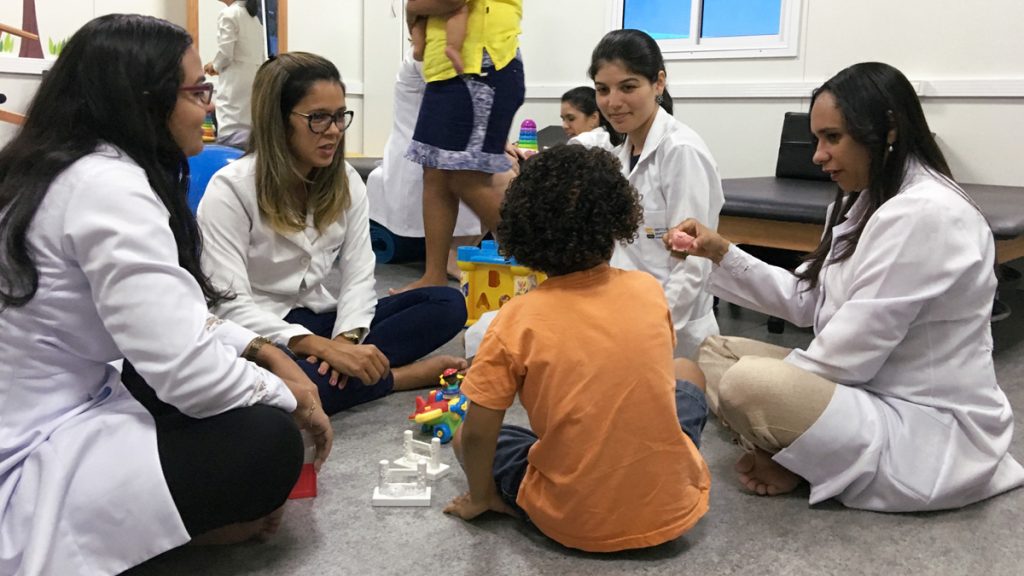
Renata Moura
Journalist
Boxes, bottles and gelatin became toys. The music that echoes through the house relaxes you and helps you get to know your body and the animals. Stories are created and told within the family, with words, draws, characters, expressions and smiles that are there – in everyone’s imagination or at hand. The universe where everything happens is inside the house.
The Santos Dumont Institute (ISD), a Social Organization linked to the Ministry of Education, launches this Tuesday (19) the “Booklet to support children with autism” in the scenario of the new coronavirus” and the disease it causes, Covid-19. With illustrations and full of ideas to inspire – many including step-by-step instructions – the material points out strategies for dealing with emotions, developing games and maintaining a healthy environment in a context in which children with ASD (Autism Spectrum Disorder) can be especially affected by the disruption of routine resulting from the quarantine.
The content also draws attention to preventive measures recommended by health authorities to avoid infection with the virus – and highlights the importance of “calm” for not only children, but also fathers, mothers and other possible caregivers to go through the challenges of the moment with more lightness. (See below the first pages of the booklet – in preview format as a book available only on the website – and click here to download it in full).
Covid-19 and autism
Autism Spectrum Disorder is a neurodevelopmental disorder that can compromise the intellectual and, at the same time, language of the affected person.
Aspects of life such as interaction with others and communication skills are impacted. Failure to socialize, repetitive speech, as well as repetitive behaviors and discomfort generated by changes in routine are characteristic and may intensify in the current scenario in which most people are encouraged to stay at home to avoid catching or transmitting Covid-19 and Activities that could be common in everyday life outside, related to leisure, school and others, do not take place.
“Breaking routine can intensify behaviors such as echolalia (repetitive speech), repetitive hand movements and even moments of emotional stress with the possibility of aggression, greater isolation, irritability and difficulty in following a eating and sleeping routine”, The team from the Multidisciplinary Care Service for Autism Spectrum Disorder, from ISD, which brings together a neuropediatrician, neuropsychologist, speech therapist, occupational therapist and physiotherapist, is noted in the booklet.
The material was created with the participation of students from Multiprofessional Residency in Health Care for People with Disabilities, from ISD. They are professionals from the areas of social work, psychology, physiotherapy and speech therapy who have the Institute's Anita Garibaldi Health Education and Research Center as their main internship field.
The booklet is based on sources such as specialized books and manuals in the area to highlight the importance of activities that involve body movement, interaction with other people and participation in daily activities at home to encourage the child's autonomy and integration.
Service at ISD

Anita was authorized by the Ministry of Health as a Specialized Center for Hearing, Physical and Intellectual Rehabilitation (CER III) in 2016 and from the following year onwards he began to assist children with ASD.
They are children aged 0 to 12 years from the so-called 7th Health Region of Rio Grande do Norte, which covers the municipalities of Natal, Extremoz, Parnamirim, São Gonçalo do Amarante and Macaíba – the center's headquarters city.
The average number of visits reaches 300 per year. And the service is “open door”, that is, it does not need a referral from other health units to get a place. To be assisted, however, you must have a Unified Health System (SUS) card, call the Center's reception and schedule a screening, using numbers 84 3271.3612 or 3271.1064. After this stage, the child undergoes a global assessment with all clinic professionals.
Currently, due to the Covid-19 pandemic, services for new patients and other in-person activities are suspended. Long-time patients receive support via telephone, WhatsApp and through content specially produced during the pandemic, such as this booklet, which has already started to be distributed to them.
Diagnosed with ASD
According to data from the World Health Organization (WHO), Autism Spectrum Disorder affects 70 million people worldwide, including 2 million in Brazil alone.
Data National Center on Birth Defects and Developmental Disabilities, Centers for Disease Control and Prevention, from the United States, point out that 1 in every 54 children is diagnosed with autism. The majority are male.
Signs can be identified in early childhood and for diagnostic purposes, they must appear by 3 years of age.
Recognizing these manifestations allows possible interventions to be initiated early, which provides more effective responses to therapies, due to greater brain plasticity in the first years of a child's life.
Text: Renata Moura / Ascom – ISD
Communication Office
comunicacao@isd.org.br
(84) 99416-1880
Santos Dumont Institute (ISD)
Social organization that maintains ties with the Ministry of Education (MEC) and whose mission is to promote education for life, forming citizens through integrated teaching, research and extension actions and to contribute to a fairer and more humane transformation of the Brazilian social reality.













